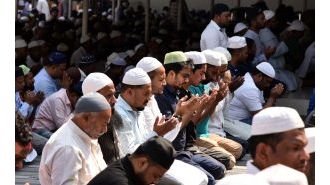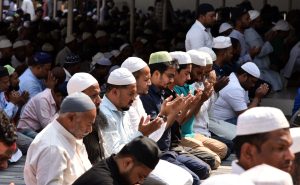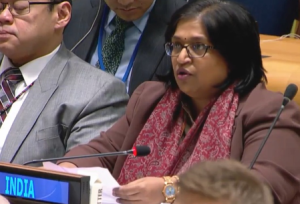President of South Korea impeached after announcing martial law.
In 2004, Roh Moo-hyun was impeached for breaking election laws but the court reversed the decision and he regained his presidential powers.

On a Saturday in Seoul, South Korea, President Yoon Suk Yeol faced a historic moment as the country's parliament voted to impeach him. This decision, which passed with a vote of 204-85, brought an end to days of political stalemate but also sparked a heated debate about Yoon's fate. As the news spread, crowds erupted in cheers, celebrating yet another display of the country's unwavering democracy.
With Yoon's presidential powers and duties temporarily suspended, Prime Minister Han Duck-soo, the second-highest official in the country, assumed the role of acting leader. However, the final decision on Yoon's impeachment rested with the Constitutional Court, which had up to 180 days to either dismiss him from office or reinstate his powers. In the event of his removal, a national election would need to be held within 60 days.
This was not the first time the National Assembly voted on Yoon's impeachment. The previous week, ruling party lawmakers had boycotted the vote, causing it to be invalidated. However, as public protests intensified and Yoon's approval ratings dropped, some members of the People Power Party changed their stance and joined the call for impeachment. National Assembly Speaker Woo Won Shik attributed the outcome to "the people's ardent desire for democracy, courage, and dedication."
In the streets, hundreds of thousands of people gathered to celebrate the decision, waving banners and K-pop glow sticks. One activist even declared on stage, "We have preserved the constitutional order!" Among the jubilant crowd, protester Kim Su-bong expressed his satisfaction, saying, "The impeachment was carried out in accordance with the people's demands, and I hope Yoon Suk Yeol will be dismissed as soon as possible. This is a victory for the people."
However, in another part of Seoul, a large gathering of Yoon's supporters grew subdued as they learned of the impeachment. In a statement, Yoon vowed to "never give up" and urged officials to maintain stability in government operations during this "temporary" pause in his presidency. He also expressed gratitude for both criticism and support and pledged to continue working for the country until the very end.
Yoon's impeachment was the result of his declaration of martial law on December 3, a decision that caused significant chaos and turmoil in the country. The decree, which lasted only six hours, was eventually overturned by a unanimous vote in parliament. In the aftermath, acting leader Han Duck-soo directed the military to increase security measures to prevent any miscalculated provocations from North Korea. He also instructed the foreign and finance ministers to reassure other nations that South Korea's external policies remain unchanged and to minimize any negative impact on the economy.
In a televised statement, Han appealed to public servants to carry out their duties diligently and ensure the smooth operation of the government. He also had a phone call with U.S. President Joe Biden, discussing the political situation in South Korea and the ongoing security challenges in the region, including North Korea's nuclear program and its military ties with Russia. The two leaders reaffirmed their commitment to maintaining and strengthening their alliance.
As the executive power in South Korea is concentrated in the office of the president, the prime minister assumes leadership in case of the president's incapacity. Han Duck-soo, with his extensive experience in various government positions, is well-equipped to take on this role. He previously served as a prime minister from 2007-2008 and has held top positions such as trade minister and finance minister.
In response to the impeachment, U.S. Ambassador Philip S. Goldberg expressed support for South Korea's "democratic and constitutional process" and stood with the people. Meanwhile, Japanese Prime Minister Shigeru Ishiba stated that his country was closely monitoring the developments in South Korea but reassured that the importance of Japan-South Korea relations remained intact.
On a Saturday, in Seoul, South Korea, the parliament made a bold move by impeaching President Yoon Suk Yeol. This came after Yoon's controversial decision to declare martial law, which lasted for only six hours. The National Assembly voted 204-85 in favor of the motion, resulting in Yoon's presidential powers being suspended and Prime Minister Han Duck-soo taking over.
Now, the Constitutional Court has up to 180 days to decide whether to dismiss Yoon as president or restore his powers. In case of his dismissal, a national election must be held within 60 days to choose his successor. This was the second vote on Yoon's impeachment, as the first one was boycotted by ruling party lawmakers. However, as public protests grew and Yoon's approval ratings dropped, some People Power Party members changed their stance and decided to vote for his impeachment.
National Assembly Speaker Woo Won Shik stated that Yoon's impeachment was a result of the people's strong desire for democracy, courage, and dedication. The news was met with jubilation and celebration by hundreds of thousands of people gathered near the parliament. On stage, a lead activist declared this as a victory for preserving the constitutional order.
Meanwhile, in a central Seoul plaza, a large crowd gathered in support of Yoon, but the mood quickly changed after hearing about his impeachment. However, Yoon issued a statement saying he would not give up and encouraged officials to maintain stability in government functions during this "temporary" pause of his presidency. He also thanked the people for both their criticisms and support and promised to continue working for the country until the very end.
Yoon's decision to impose martial law on December 3rd caused massive political turmoil, halted diplomatic activities, and affected financial markets. However, the parliament unanimously voted to overturn his decree, leading to his forced lift of martial law. In light of this, Han, the acting leader, has ordered the military to strengthen its security posture to prevent any provocations from North Korea. He also instructed the foreign and finance ministers to ensure that the country's external policies remain unchanged and minimize any negative impacts on the economy due to the political turmoil.
In a televised statement, Han earnestly asked public servants to carry out their duties without any neglect and ensure that the government operates without any disturbance. He also had a phone call with U.S. President Joe Biden, discussing the political situation in South Korea and regional security challenges. The two leaders reaffirmed their commitment to maintaining and strengthening their alliance.
It is worth noting that South Korea's executive power lies mainly with the president, but in case of incapacity, the prime minister takes over. Han, a seasoned official with previous top government positions, including prime minister, is now leading the country. U.S. Ambassador Philip S. Goldberg expressed support for South Korea's democratic and constitutional process, while Japanese Prime Minister Shigeru Ishiba stated that the developments in South Korea would not affect the importance of Japan-South Korea relations.










